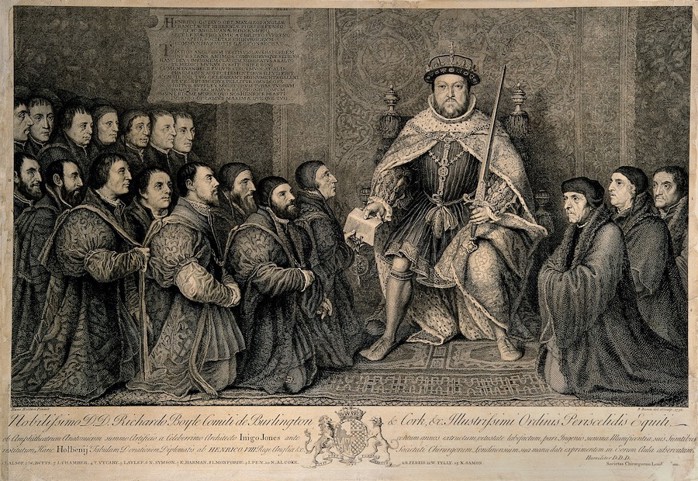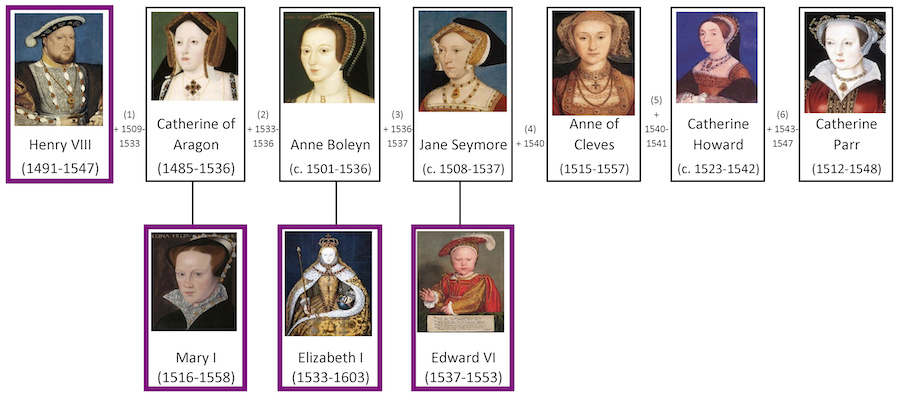
Could Henry VIII have had Kell positive blood?
August 4, 2016

- Related Topics:
- Blood type,
- Sex ratio,
- History
A high school student from Spain asks:
"One of the theories as to why Henry VIII of England could not have sons is that he may have had Kell positive blood. But what actually happens when you have Kell positive blood and why would that make it hard for him to have a son?"
Henry VIII is famous for killing off his wives for failing to give him a son. But his wives weren’t just failing to have sons. Instead, hardly any of their children survived after the first one
By chance most of his wives and mistresses had daughters for their first child. And then, thereafter, all of the sons and daughters either were miscarried or died soon after birth.
This sounds an awfully lot like something that happens when dad has Kell positive blood and mom has Kell negative blood. In these cases, the first child is often fine but any kids that come after can have trouble. And in medieval England, the doctors could not help these later kids.
Of course there are probably other explanations. But this one also makes sense because of the way that Henry VIII started acting later in life.
For genetic reasons, Kell positive people (and especially men) are at a higher risk for a disease called McLeod syndrome. People with this condition tend to be fine until they hit middle age and then various physical and behavioral changes can kick in. This is exactly what happened to Henry VIII later in life when he started beheading his wives.

Just think, if modern testing were around, Henry VIII might have been able to look for a wife who was Kell positive like him. It might have taken some searching as only around 9% of Europeans have Kell positive blood, but he might have eventually found someone.
Then if he did find her, he could have had many sons and maybe wouldn't have felt the need to behead his wives. Well, at least not for a lack of sons. Once McLeod took him over he may have found other reasons.
Attack on Non-Self
Henry VIII’s problems having kids come down to his wives’ immune systems. Basically they are primed to attack anything with Kell positive blood. This includes their own kids' blood.
But these moms' immune systems are only primed. It isn’t until her immune system actually sees Kell blood for the first time that there is a problem. And this usually happens with the first birth when blood from mom and baby mixes.
Now mom’s body starts to crank out antibodies that attack and destroy any Kell positive blood. This includes the blood of the children she is carrying if they ended up with Kell positive blood from their dad.
What happens then is that these antibodies destroy the baby’s blood cells. This hemolytic disease of the newborn (HDN) is what causes her kids problems.
Back in Henry VIII’s time, there wasn’t a lot the doctors could do about this. If these kids ended up with HDN, they wouldn’t have lived for very long at all.
In today’s world these babies have a better chance at survival. Doctors can often give the babies transfusions soon after birth or even before birth.
And luckily for everyone, being Kell positive is not very common. Over 90% of people are Kell negative.
Still, some kids do suffer from Kell-based HDN today. But this does not have to be forever.
One day there may be a way to keep this form of HDN from happening. We just need to look at the Rh blood system to see how this might work.

How Kell and Rh Are Similar
The Rh blood system, the positive and negative part of your blood type (for example, A+), is similar to the Kell system. If mom is Rh-, then her Rh+ babies can be at risk just like in the Kell situation.
But one way that the two are not similar is that people are routinely screened for whether or not they are Rh-. And there is a way to prevent any problems in the cases where mom is Rh- and dad is Rh+. It is a shot that goes by the name of RhoGAM.
When women get this shot during their pregnancy, their immune systems no longer attack their baby’s Rh+ blood. This shot has certain antibodies in it that get rid of any Rh+ blood cells before mom’s immune system can react. Her immune system stays primed but doesn’t react.
Because of extensive testing and the right medical care, hemolytic disease of the newborn (HDN) has become less and less common with Rh- moms. The same is not true for Kell negative moms.
Right now there is no equivalent to RhoGAM for moms who are Kell negative and are carrying a Kell positive child. In fact, it isn’t even routinely tested for when people donate blood.
This last point matters because it means that some Kell negative women are given Kell positive blood during a transfusion. Now their immune system reacts to this transfused blood making antibodies that will attack any Kell positive blood they encounter. This is how a woman’s first child might be affected (not a problem in Henry VIII’s time as there were no transfusions).
So one explanation for Henry VIII’s lack of sons and erratic behavior later in life could be because he was Kell positive and had the right genetics to be at a higher risk for McLeod syndrome. But we won’t know for sure unless scientists can directly test his DNA.

Author: Dr. Barry Starr
Barry served as The Tech Geneticist from 2002-2018. He founded Ask-a-Geneticist, answered thousands of questions submitted by people from all around the world, and oversaw and edited all articles published during his tenure. AAG is part of the Stanford at The Tech program, which brings Stanford scientists to The Tech to answer questions for this site, as well as to run science activities with visitors at The Tech Interactive in downtown San Jose.
 Skip Navigation
Skip Navigation
